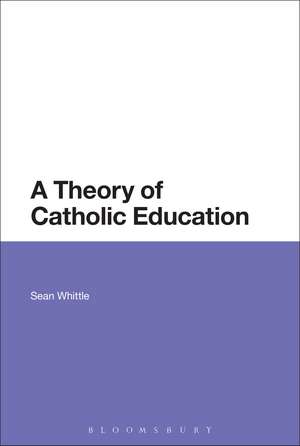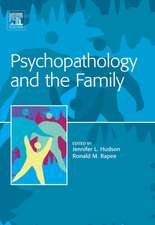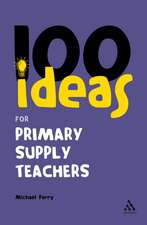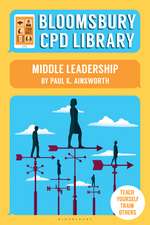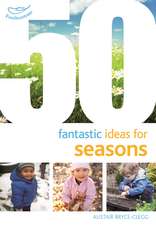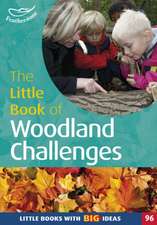A Theory of Catholic Education
Autor Sean Whittleen Limba Engleză Paperback – 24 iul 2016
| Toate formatele și edițiile | Preț | Express |
|---|---|---|
| Paperback (1) | 256.77 lei 6-8 săpt. | |
| Bloomsbury Publishing – 24 iul 2016 | 256.77 lei 6-8 săpt. | |
| Hardback (1) | 773.81 lei 6-8 săpt. | |
| Bloomsbury Publishing – 19 noi 2014 | 773.81 lei 6-8 săpt. |
Preț: 256.77 lei
Preț vechi: 330.80 lei
-22% Nou
Puncte Express: 385
Preț estimativ în valută:
49.15€ • 50.65$ • 41.49£
49.15€ • 50.65$ • 41.49£
Carte tipărită la comandă
Livrare economică 03-17 martie
Preluare comenzi: 021 569.72.76
Specificații
ISBN-13: 9781474286527
ISBN-10: 1474286526
Pagini: 232
Dimensiuni: 156 x 234 x 12 mm
Greutate: 0.33 kg
Ediția:NIPPOD
Editura: Bloomsbury Publishing
Colecția Bloomsbury Academic
Locul publicării:London, United Kingdom
ISBN-10: 1474286526
Pagini: 232
Dimensiuni: 156 x 234 x 12 mm
Greutate: 0.33 kg
Ediția:NIPPOD
Editura: Bloomsbury Publishing
Colecția Bloomsbury Academic
Locul publicării:London, United Kingdom
Caracteristici
Advances a clear line of argument, drawing on the relevant literature, from official Church teaching and Newman to Maritain and Rahner
Notă biografică
Sean Whittle is a secondary school teacher of Religious Education and Philosophy with over twenty years' experience working in various Catholic schools in London. He has a PhD in Philosophy of Education from the IOE, UCL's Faculty of Education and Society, University College London, UK.
Cuprins
AcknowledgementsIntroduction1. Testing times for Catholic education2. Official Church teachings and the theory of Catholic education3. Newman and the theory of Catholic education4. Maritain and the theory of Catholic education5. How to go about constructing a robust theory of Catholic education6. Using the theology of Karl Rahner to develop the theory of Catholic education7. Mystery, Rahner and the theory of Catholic education8. Are there any mysteries that are unsolvable in principle?9. Practical proposals for the curriculum10. Towards a theory of Catholic educationConclusionBibliographyIndex
Recenzii
[This] is a fluently written, elegantly designed, thought-provoking, critically probing and constructive book. Whittle... offers a rational defence of Catholic education for the 21st century, opens out some strikingly new avenues towards the non-confessional curriculum entailed by his theory of Catholic education, and supplies a much-needed prompt to move debates on this subject forward to a new level.
This book is important for three reasons. First, Catholic schools (as the book explains) constitute a very large number of schools both world-wide and in the UK. No comprehensive account of education can omit reference to their distinctive contribution to education as a whole. Second, that contribution is increasingly challenged externally by those who see the very nature of faith-based schools to undermine the integrating nature of schooling in diverse and multicultural societies. 'We should be supporting the 'common school''. Third, the nature of that contribution is increasingly challenged from within the Catholic Church as the curriculum and the teaching need to take account of the cultural influences impinging on the lives of its pupils.The book - careful, systematic and well-informed - deals with each of these challenges. It is both philosophically and theologically of high quality. It deserves to be read by all those who govern and teach in Catholic schools, and by those who question their very existence in an increasingly hostile world.
This book is important for three reasons. First, Catholic schools (as the book explains) constitute a very large number of schools both world-wide and in the UK. No comprehensive account of education can omit reference to their distinctive contribution to education as a whole. Second, that contribution is increasingly challenged externally by those who see the very nature of faith-based schools to undermine the integrating nature of schooling in diverse and multicultural societies. 'We should be supporting the 'common school''. Third, the nature of that contribution is increasingly challenged from within the Catholic Church as the curriculum and the teaching need to take account of the cultural influences impinging on the lives of its pupils.The book - careful, systematic and well-informed - deals with each of these challenges. It is both philosophically and theologically of high quality. It deserves to be read by all those who govern and teach in Catholic schools, and by those who question their very existence in an increasingly hostile world.
